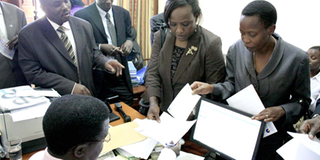The high cost of bribing MPs

MPs have been at more and more pain to explain the exorbitant pay-outs that are regularly dished out to them. PHOTO BY NELSON WESONGA.
It is not just the health sector that will continue to struggle to make ends meet after the general elections in February. The economy faces similar potential difficulties--blamed on what analysts call “political diagnosis” by decision-makers in government.
Even with cash handouts, it is easy to dismiss this forecast. After all, Finance Minister Syda Bbumba insists that the economy is expected to grow between 6 and 7 per cent, partly, due to recovery in exports and improved remittances.
As Ms Bbumba whose docket approved the Shs20 million ‘bribe’ to each MP concedes that the government is “broke”, technocrats in Finance admit that such projections of our economy apply only if no efforts are taken to stop abuses of public resources and leakages in the system.
Returning the loot
There are seriously suspicions that the ruling NRM party has raid the national Treasury to fund its outrageously expensive campaign for Mr Yoweri Museveni’sre-election, among others. By some lawmakers choosing to return the Shs20 million ‘bribe’—coming less than three weeks to the general elections, this new breed of politicians, seem to have shamed the devil and ultimately, let the cat out of the bag!
But with nobody willing to explain the source of the Shs6.5 billion worth of taxpayers’ money gifted to 326 lawmakers to monitor unspecified “government programmes,” Uganda Debt Network Assistant Director Martha Nanjobe and other watchers are now warning of belt-tightening in the aftermath of the February 18 polls.
“This is free money for MPs to abuse,” Ms Nanjobe said. “Without an accountability mechanism, and regulatory framework as required by the Public Finance and Accountability Act, 2003, this money is likely to be abused in the process. People need service delivery yet the government is just giving free money to MPs to duplicate roles for other government agencies.”
Whereas it appears to be simplistic for anyone to argue that the Shs6.5 billion gifted to MPs could plunge the economy into disarray, analysts say the Shs602 billion in the supplementary budget the government suspiciously withdrew from the Treasury last month, is a recipe for disaster.
Already, Finance Minister Syda Bbuma, who sanctioned the Shs20 million for each MP in cash handouts is conversely screaming loud over lack of funds to run government programmes. Blaming the situation on the upcoming general elections, Ms Bbumba warned of cold times ahead and hinted on re-allocation to salvage the situation.
Re-allocation means that as Ugandans vote for the next leader, most of the planned activities in the 2010/11 budget will either be partially or not implemented at all as government struggles to find funds to run priority areas in health, education, defence, agriculture and infrastructure.
“It doesn’t make sense to give MPs Shs6.5 billion when the country is broke,” the Executive Director Anti-Corruption Coalition Uganda Cissy Kagaba said. “As civil society, we want all the MPs to refund taxpayers money to run government programmes. Even those who want to give it to their constituents, it’s not right this money must be refunded it’s a bribe.”
Dire straits
As of November last year, the country had about $2.7 billion (Shs5.4 trillion) in foreign reserves. However, Bank of Uganda has since sold $60 million (Shs120 billion) to salvage the depreciating shilling – an intervention which doesn’t seem to have done enough.
The dollar is now averaging Shs2,300. Again, Shs498.4 billion out of the Shs602 billion was funded by a draw down from the reserves-- leaving a widening black hole in the Treasury.
Although economists in Ministry of Finance and Bank of Uganda claim that the economy is expected to grow between 6 and 7 per cent, partly due to the recovery in the coffee exports, independent watchers say cash handouts to politicians have by far left a “black hole” in the Treasury.
Latest figures from Ministry of Finance indicate that the country’s Gross Domestic Product (GDP) is then expected to grow by 10 to 12 percent in the 2010/2011 fiscal year. But the opposition, most of whose members in the House have since decided to return the money to Treasury, said “this growth is not seen in people’s pockets” and described the figures supplied by Ms Bbumba as “fictitious”.
Questioning the politics of the Shs20 million “bribe” Shadow Finance Minister Oduman Okello (Bukedea FDC) described Ms Bbumba as “a yes minister”. “Ms Bbumba just follows ‘orders from above’ without questioning,” Mr Okello said. “She doesn’t care about the macro-economic stability of our country as long as President Museveni asks for money. This is wrong. We are sinking but she continues to paint a rosy picture that all is well, yet the truth is that our people don’t have jobs, the sick cannot find drugs in hospitals, no doctors and roads are crumbling everywhere.”
“It’s ridiculous that she gives MPs Shs20 million without accountability and then cries foul that the government is broke. It’s common knowledge that giving free money to politicians distorts macro-economic stability. This is not right. Ugandans should prepare for the worst as government continues to borrow and cuts budgets to finance key priority areas.”
This will happen in an environment where business with our largest trading partner, South Sudan, has almost ground to a standstill as uncertainty about its future post-referendum persists.
In the same situation fuel prices are maintaining a steady rise while food production is expected to drop as the weather department predicts torrid weather conditions in the first half of the year which is already dry and dusty.




